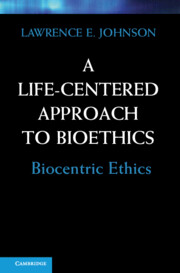Book contents
- Frontmatter
- Contents
- 1 Introduction
- Part I Backgrounds
- Part II Life, Death, and Bioethics
- 6 Being Alive
- 7 Being Healthy
- 8 Health and Virtue
- 9 Death and Life
- 10 Drawing Lines with Death
- 11 Double Effect
- 12 Concerning Abortion
- 13 The Gene, Part I
- 14 The Gene, Part II
- 15 Ethics and Biomedical Research
- 16 Bioethics Seen in an Eastern Light
- 17 Toward a Wider View
- Bibliography
- Index
- References
14 - The Gene, Part II
Manipulation
Published online by Cambridge University Press: 05 June 2012
- Frontmatter
- Contents
- 1 Introduction
- Part I Backgrounds
- Part II Life, Death, and Bioethics
- 6 Being Alive
- 7 Being Healthy
- 8 Health and Virtue
- 9 Death and Life
- 10 Drawing Lines with Death
- 11 Double Effect
- 12 Concerning Abortion
- 13 The Gene, Part I
- 14 The Gene, Part II
- 15 Ethics and Biomedical Research
- 16 Bioethics Seen in an Eastern Light
- 17 Toward a Wider View
- Bibliography
- Index
- References
Summary
Beyond doubt, we could improve the human condition by forestalling or ameliorating the effects of problematic genes. Might it also be a good strategy to entirely replace defective genes with better ones? The prospect of genetic modification, genetic engineering, is one that is becoming more and more inescapable. Nevertheless, it is not entirely clear just which things would come under this wide and ill-defined heading. Neither are the central ethical issues sufficiently clear or adequately addressed. There are few topics that lead to more widespread debate or that stir more intense feelings. There is fear of our creating (or becoming) monsters, of maniacs cloning multiple copies of themselves, of our disrupting the very fabric of human life, or of our turning loose new organisms, unnatural and genetically modified, to destroy ourselves or our biosphere. What else, we might wonder, might there be to fear? However, there is hope that advances in genetic modification might lead to means for alleviating or preventing some of the most horrific adversities we humans face. Perhaps we can find ways to improve our health and the health and makeup of our children or to provide nutritious food to feed malnourished billions. We are fearfully and hopefully aware that we are prying open the unknown and that, in whatever form, important consequences are bound to ensue.
As with previous matters, I cannot offer a general formula for resolving all ethical problems that might arise in connection with genetic engineering. Indeed, I believe that only a fool or a charlatan would promise that. This is due both to the expanding width and amorphous nature of the subject matter and to the limitations of formulae. Nonetheless, I offer the general considerations we have canvassed as allowing us to develop useful insights for dealing with such matters. Among other points, I argue that those approaches to ethics that concentrate on living things rather than on living processes, and that moreover focus exclusively on discrete individuals, are at a disadvantage in dealing with the ethics of genetic engineering. They should be supplemented with broader conceptions, centering on the interests of living processes. I go on to suggest that we need to take a broader look at the nature of humanity.
- Type
- Chapter
- Information
- A Life-Centered Approach to BioethicsBiocentric Ethics, pp. 279 - 318Publisher: Cambridge University PressPrint publication year: 2010



